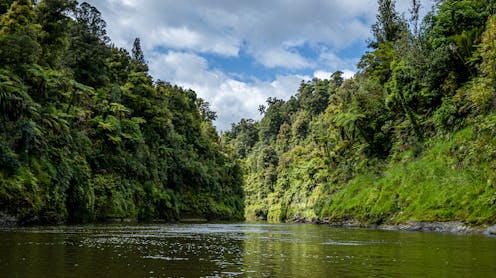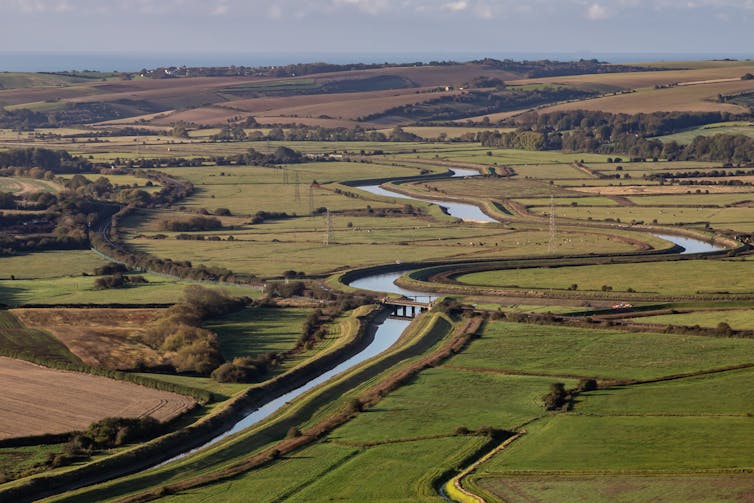 New Zealand has granted legal personhood to the Whanganui River. Ron Kolet / shutterstock
New Zealand has granted legal personhood to the Whanganui River. Ron Kolet / shutterstockMost rivers need some human help to stay clean and healthy and to flow freely. People have to fish out litter, block sewage, look out for invasive species and so on.
This is obvious enough. But, as rivers are increasingly being granted legal rights of their own, they’ll need another form of human help: people willing to be their legal representatives, filing lawsuits and speaking in court.
This roundup of The Conversation’s climate coverage comes from our award-winning weekly climate action newsletter. Every Wednesday, The Conversation’s environment editor writes Imagine, a short email that goes a little deeper into just one climate issue. Join the 40,000+ readers who’ve subscribed.
The idea that nature should be granted rights similar to that of a human (sometimes described as “legal personhood”) has been around for a few decades now. Though some lakes, forests and other features have been awarded these rights, it’s rivers that are the main beneficiaries. Most recently, the River Ouse in East Sussex, England, was awarded rights by its local council, following similar moves in places as diverse as New Zealand, Ecuador, Canada and India.
“Rivers often have strong cultural and spiritual identities as sacred living entities or life-giving beings. These existential understandings have underpinned legal actions.” That’s according to Nick Mount, a rivers expert at the University of Nottingham.
Back in 2017, Mount travelled to Colombia to visit the River Atrato. The Atrato flows through a remote and highly biodiverse jungle, in a region which at the time remained a paramilitary stronghold. The country’s constitutional court had recently awarded the river humans rights and Mount wanted to see what that meant in practice.
“The Atrato River has been awarded rights,” he said, “because of what it provides for human life – not because it should be equated with human life”. He continued “this places a significant burden on the Colombian state to ensure the rights are enforced – and it demands that local people are empowered to manage their river properly”.
However, “the reality was sobering”. He found deforested riverbanks, so contaminated with chemicals that plants could not regrow. He found industrial dredging had reshaped an entire river to the point where its regular nutrient-cycling floods had broken down entirely, while whole human communities had been displaced.
“The Atrato River in general, and [its tributary] the Rio Quito in particular, serve as a stark reminder that awarding environmental rights is not the same as realising them. Such rights don’t exist within a vacuum, of course, and they will only be fulfilled if political, socio-economic and cultural systems support them.”
Read more: Can a river have legal rights? I visited the jungles of Colombia to find out
So what might a more supportive human system involve? Oluwabusayo Wuraola is a law lecturer at Anglia Ruskin University. Writing about the recent River Ouse news, she agrees with Mount that “simply granting a river some rights isn’t enough” and adds that “we now need to think about who will actually defend these rights”.
 The River Ouse, playing hide and seek.
Melanie Hobson / shutterstock
The River Ouse, playing hide and seek.
Melanie Hobson / shutterstock
“Appointing representatives who care about their own personal and property interests would be a grave mistake, as would appointing anyone who prioritises the rights of humans to a healthy environment over a more intrinsic right of nature (remember: the idea is that the River Ouse has rights in itself and shouldn’t need to demonstrate its worth to humans).”
In her analysis, “the most effective defenders of the rights of nature in many court cases” have been people with an “ecocentric perspective”. That means an outlook that prioritises the intrinsic value of nature itself, rather than focusing on how it can serve human interests. She cites instances where the supposed advocates for a river’s rights in court were actually motivated by wanting to protect their own property downstream.
Ultimately, though “moves to give rights to nature are promising … we’ll need a whole army of nature protectors to actually enforce those rights”.
These ideas can be applied to rivers in the news right now. For instance, China recently approved the construction of the world’s largest hydroelectric dam on the Yarlung Tsangpo river in Tibet.
The dam will provide enormous amounts of clean energy – when complete, it will be the world’s largest power plant by some distance. But it will also displace people, destroy ecosystems and, of course, disrupt the river itself.
Mehebub Sahana, a geographer at the University of Manchester, points out the effects may be especially severe downstream in India and Bangladesh, where that same river is known as the Brahmaputra and helps form a vast and incredibly fertile delta system.
For him, the dam highlights “some of the geopolitical issues raised by rivers that cross international borders”. “Who owns the river itself,” he asks, “and who has the right to use its water? Do countries have obligations not to pollute shared rivers, or to keep their shipping lanes open? And when a drop of rain falls on a mountain, do farmers in a different country thousands of miles downstream have a claim to use it?”
These are crucial questions, even if they’re ultimately framed around humans. An ecocentric representative might argue the Yarlung Tsangpo/Brahmaputra has an intrinsic right to flow undisturbed and to dump its sediment where it pleases.
There may be a happy medium. Viktoria Kahui is an environmental economist at the University of Otago in New Zealand. Last year, she investigated 14 examples of rights-of-nature from around the world.
She found a “fundamental divide between local communities and external economic interests”. In some cases, interest groups were able to overturn the provision of nature rights.
She therefore recommends that “future rights-of-nature frameworks need to … include appointed guardians, established as separate legal entities with limited liability, as well as the support of representatives from interest groups”.
Read more: Granting legal ‘personhood’ to nature is a growing movement – can it stem biodiversity loss?
In the Yarlung Tsangpo/Brahmaputra example, those interest groups might include rice farmers and mangrove conservationists in Bangladesh, or fishermen a thousand miles upstream. They might include the millions of people who would gain electricity, or the thousands who would lose their homes. The river itself could also be an interested party, perhaps via eco-centric human representatives.
Exactly where you draw the line in these cases is tricky. But with rivers increasingly being granted legal rights, this isn’t the last you’ll hear of this issue.

 2 months ago
496
2 months ago
496 
















 English (United States) ·
English (United States) ·